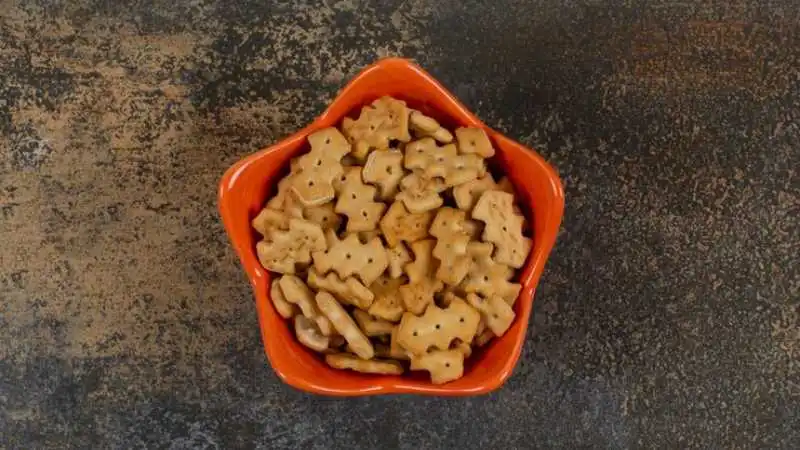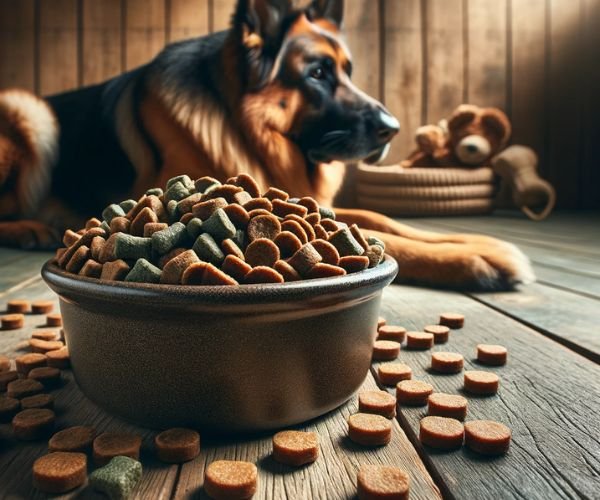Determining the appropriate German Shepherd food intake is crucial for the healthy development of these active and intelligent dogs. Puppies typically require more calories per pound of body weight than adult dogs due to their growth needs and higher energy levels. Their diet must be rich in good-quality protein and fat from whole-food sources, tailored to support their rapid development.

Keeping a close eye on the puppy’s growth and adjusting the food intake accordingly is critical to ensuring they grow strong and healthy. Portion control and regularly scheduled meals can help prevent overeating and maintain an ideal weight. Giant breeds like German Shepherds need to avoid joint issues as they grow.
How Much Should German Shepherds Eat?
As family dogs, German Shepherds are known for their loyalty, intelligence, and high energy levels, which can often lead to worries for new pet parents about their dog’s diet. A good diet is vital to a pet’s long, healthy life, while the wrong diet could result in health problems, which is particularly concerning for big dogs with active lifestyles.
Understanding the proper nutrition for the different stages of their lives is essential. This guide offers advice on the proper German shepherd food intake, providing insights into what to feed them and what to expect as they grow. With the correct information, pet owners can ensure their German Shepherd’s dietary needs are met, supporting their overall well-being at every life stage.
German Shepherd Food Guide Table
| Age | Weight | Activity Level | Daily Food Amount |
| Puppy (2–6 months) | Varies with growth | High (growing puppies) | 2-3% of their expected adult body weight, divided into 3-4 meals |
| Young Adult (6–12 months) | Approaching adult weight | High | 1.5–2.5% of their current body weight, divided into 2 meals |
| It depends on the health | 50–90 lbs (22.5–40 kg) | Moderate | 2-3 cups of high-quality dry food, divided into 2 meals |
| Senior (7+ years) | It depends on health | Low to Moderate | 1.5-2.5 cups of high-quality dry food, divided into 2 meals, adjusted for lower activity level |
Feeding your German Shepherd Puppy
A German Shepherd puppy’s diet must be enriched with high-quality protein, which is paramount for their growth and high energy needs. According to the American Kennel Club (AKC), large breeds like German Shepherds can benefit from foods specifically formulated for large breed diets to support their growing joints and prevent issues later in life.
It’s vital to balance a nutrient-dense diet with proper portion sizes to avoid overfeeding, which can lead to obesity and stress on developing bones and joints.
Regular weigh-ins and monitoring of your pup’s weight can help guardians adhere to the directions provided on puppy food packaging and maintain the ideal German shepherd food intake.
Puppies generally require more calories than adult dogs, but it’s essential to distribute these calories throughout the day in controlled portions.
Vets can offer advice on nutritional requirements and provide specific directions to support a growing German Shepherd, preventing underfeeding or overfeeding.
Puppy food geared towards large breeds is available at pet stores, and it’s usually infused with extra support for a large breed puppy’s growth needs, ensuring that the pups grow into healthy adults.
German Shepherd Puppy Feeding Guide Table
| Puppy Age | Daily Meals | Daily Food Amount |
| 2-3 months | 4 meals | 1/2 to 1 cup of high-quality puppy food |
| 3-6 months | 3 meals | 1 to 1 3/4 cups of high-quality puppy food |
| 6-12 months | 2 meals | 1 3/4 to 2 1/2 cups of high-quality puppy food |
I have a German Shepherd puppy. How often should I feed it?
Consulting a vet can offer invaluable advice for German Shepherd puppies, mainly when they are rapidly growing and their owners may need clarification on the correct feeding amounts. Typically, puppies around 3 months old benefit from being fed 4 meals daily.
This frequent feeding supports their development and provides energy for their active bodies. As they reach the age of about 6 months, and their growth rate begins to slow down, it is often advised to reduce the German shepherd’s food intake to 3 meals a day to prevent overfeeding.

When German Shepherd puppies approach 10 months old, transitioning to 2 meals daily, mimicking adult dogs’ feeding regimes, is standard practice. It’s vital to check the packaging of your puppy’s food for recommendations from the individual manufacturer and to monitor your pet’s health and growth to tailor their diet appropriately. The goal is to support the maturation of the puppy without overfeeding, which can be detrimental to their health.
When should I start feeding adult German Shepherds food?
Transitioning from German Shepherd puppy food intake to an adult diet is a significant step in your dog’s life. Being large dogs, German Shepherds continue to develop and may only reach full maturity once they are 18–24 months old. However, most puppies can start moving to an adult diet when they are about 10–12 months old, which often coincides with the time they approach their adult size.
The switch should be gradual over several weeks, mixing increasing amounts of adult food with their usual puppy food to avoid digestive upset. This careful transition ensures that the changing nutritional needs are met without causing undue stress on the dog’s system, ultimately leading to a well-rounded German shepherd food intake as they grow into adulthood.
Feeding your adult German Shepherd Food
Proper diet and exercise are the cornerstones of maintaining an adult German Shepherd’s health, as they typically weigh in at a robust 65–90 lbs. Energy levels in these dogs vary, with some high-energy individuals needing more calories to sustain their lifestyle. If you suspect your dog isn’t eating enough to support its activity level, it’s crucial to reassess its diet.
This guide helps identify signs that your German Shepherd may require an increase in nutrients, especially if they are burning off more calories than they consume due to vigorous exercise. Besides the quality of the food, it’s essential to consider the timing and frequency of eating; typically, two meals spaced about 12 hours apart can provide a steady energy supply.
Always weigh your dog regularly, and don’t hesitate to replace your current food intake with higher-calorie options if needed under the guidance of a veterinary nutritionist to ensure your dog continues to thrive.
How often should I feed my German Shepherd?
When it comes to rewarding your German Shepherd, treats should be incorporated sensibly into their diet to maintain optimal health. Treats should not exceed 10% of your dog’s daily food intake, as they are meant to be a small token of affection or a tool for training rather than a substantial part of their nutrition.

Adult dogs, fed two meals a day, can benefit from the discipline and excitement of earning these small delicacies. However, it’s crucial to account for treats when assessing total caloric intake to avoid unintentional overfeeding. Regularly consult with your vet to ensure that treats are provided in a way that contributes positively to your German Shepherd’s overall well-being and dietary balance.
When should I switch from adult to senior food?
As German Shepherds reach the senior stage of life, around 8 years or older, their nutritional requirements change. Supporting these less active dogs with a senior diet that maintains the right balance of lower calories and higher-quality protein is crucial. Senior-specific foods are formulated to adjust to a slower metabolism and can help manage weight to prevent extra stress on aging joints.
These diets often include supplements like calcium and glucosamine, which benefit older dogs prone to joint problems like osteoarthritis. Switching to senior foods should be done gradually, matching the dog’s body condition with an appropriate caloric intake, ensuring that despite their decreased activity, they receive all the nutrients they need for their health and longevity.
What type of food should German Shepherds eat?
German Shepherds, known for their excellent appetite and status as large working dogs, require a protein-rich diet to support their muscular build and active lifestyle. When considering what type of food to provide, owners have various options, including commercially prepared dry and wet foods.
A meat-based diet is generally preferred, as it closely mimics their ancestral nutritional habits, although it’s essential to ensure they receive a balanced diet. Dry food, or kibble, is beneficial for its long shelf life and convenience, and when paired with wet food, it can cater to German Shepherds, who are more fussy eaters, providing a variety of textures and flavors.
Including doggy superfoods, such as blueberries and sweet potatoes, can be a nutritious addition to their diet mix, providing essential vitamins, antioxidants, and fiber. Additionally, a proper balance of calcium is paramount, particularly for German Shepherds, as it supports their bone health and is especially crucial for growing puppies.
A mix of wet and dried food can cater to their dietary needs and preferences, ensuring they maintain a healthy weight and digestion. Always consult a professional veterinarian to determine the exact nutritional requirements for your German Shepherd to support their energy demands and health needs.
Dry Food

Dry food, known as kibble, is a popular choice for feeding German Shepherds for several reasons. Its crunchy texture helps to maintain the dog’s teeth by reducing plaque buildup, a benefit not provided by softer wet foods. Since dry food has a lower water content, it’s easy to store and cost-effective, offering owners a viable option to feed their dogs without incurring high expenses.
For dogs who need to increase their water intake, kibble can be lightly soaked in water before serving, encouraging them to drink more and promoting healthy hydration. In addition, many dry foods are formulated with extra nutrients to support a healthy canine diet, making them a staple in many German Shepherd feeding routines.
Wet Food
Wet food is another excellent dietary option for German Shepherds and comes with its own set of benefits. Dogs naturally crave flavors and textures that resemble their ancestral diet, so the chunks of meat in jelly or gravy are often more appealing. Wet food can stimulate the appetite of picky eaters who prefer its meaty taste and aromatic smell.
It also contains a higher water content, which benefits hydration, particularly for dogs needing more water alone. However, it’s essential to remember that wet food can spoil more quickly than dry food and should be consumed promptly to maintain its freshness. While it’s a flavorful addition to a dog’s diet, it’s essential to continue monitoring dental health since wet food doesn’t provide teeth-cleaning benefits like dry kibble.

Final Thoughts
German Shepherds stand out as large and active dogs with demanding nutritional requirements that shift throughout their lives. From the rapid growth stages of puppies to their robust adult years, striking the right balance of nutrients in their diet is crucial.
These energetic canines need ample protein to replenish their energy reserves, especially after vigorous exercise. At the same time, calcium and other essential nutrients are vital to maintaining their overall physical and mental health. They typically require two properly portioned meals daily, interspersed with healthy treats, to keep them in peak condition.
Owners should be mindful when selecting specific foods formulated for large breeds, ensuring the chosen wet and dried food caters to their palates while fulfilling their dietary needs. Dry food helps support dental health and is convenient, while damp food offers tantalizing tastes that can persuade even the fussiest eaters. Combining both can create a comprehensive and nutritious meal plan for these loyal companions when seasoned with a blend of canine-safe fruits and vegetables.
FAQs
How much food should a German Shepherd eat a day?
The amount of food a German Shepherd should eat daily varies depending on size, age, and activity level. An adult German Shepherd might typically require 2 to 3 cups of high-quality dry dog food split into two meals daily. Always consult a veterinarian to tailor the feeding schedule and quantity to your dog’s health needs.
How much is 1 cup of dog food?
Typically, one cup of dry dog food weighs approximately 4 ounces (113 grams). It’s essential, however, to consult the feeding guide on your dog’s food packaging or with a veterinarian, as caloric content can vary significantly between different brands and formulations. Adjustments to the portion size may also be necessary based on your dog’s weight, age, and activity level.
Do German Shepherds go hungry for long periods of time?
German Shepherds can survive up to three days without food, but this is not recommended as it can seriously affect their health. It’s vital to note that even one day without eating can be harmful, particularly for puppies, seniors, or dogs with health issues. Always ensure consistent feeding schedules and consult a vet for any concerns regarding your pet’s appetite.
What not to feed a German Shepherd Food?
German Shepherds should not be fed chocolate, grapes, or onions as these can be toxic to the breed. Avoid giving them cooked bones or foods high in sugar and fat to prevent digestive issues and maintain a balanced diet. Avoiding foods containing xylitol, a common sweetener harmful to dogs, is also essential.
